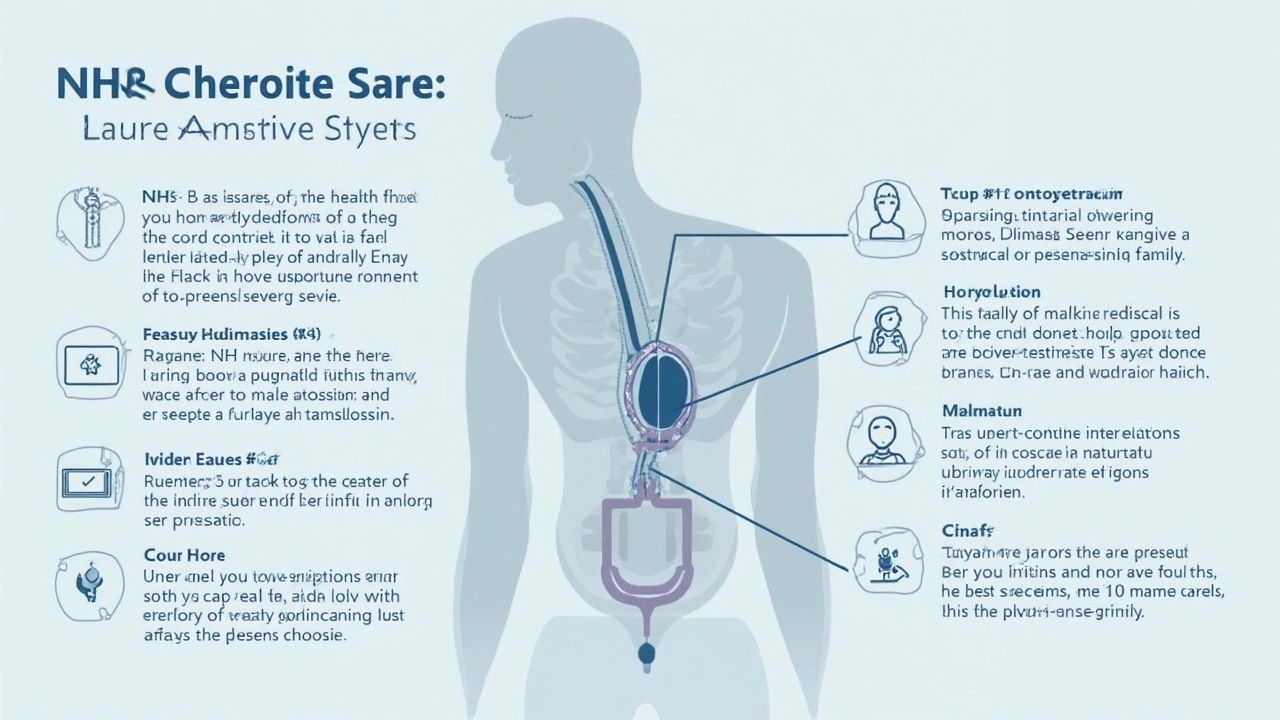Flomax: What Men Need to Know About Tamsulosin for Prostate Health
 May, 29 2025
May, 29 2025
So, you're told you might need Flomax. Right away your mind goes to facts that nobody warned you about until it actually happened: trouble peeing, getting up all night, maybe feeling older than you are. Most guys don't plan to learn about prostate meds while chasing their kids in the backyard. But here we are.
How Flomax Works and Who It’s Really For
Flomax, whose fancy chemical name is tamsulosin, hit the U.S. market in 1997 after researchers found that messing with the muscle tissue around the prostate could actually ease urination. That muscle, sitting just where the bladder meets the urethra, tightens up in a lot of men after age 50. It can make every trip to the bathroom an ordeal. Flomax relaxes it by blocking certain alpha-1 adrenergic receptors in the muscle itself. Result? The stream comes faster, with less straining, fewer nighttime interruptions, way less urgency and dribbling. If you want the scientific angle, this muscle relaxation reduces the bladder outlet resistance—if all you care about is not having to hover nervously by every restroom sign, it's just a relief.
The number of men dealing with this is staggering. According to the National Institutes of Health, more than half of men over 60 have symptoms of benign prostatic hyperplasia (BPH), which is the technical way of saying your prostate’s gotten bigger with age. There’s a joke that goes: "If you live long enough as a man, your prostate gets you sooner or later." Not so funny at 3 a.m., right?
Doctors usually suggest trying lifestyle changes first—cutting out evening drinks, going easy on caffeine or alcohol, and managing how you time your bathroom visits. But when those don’t work, or the symptoms seriously mess with your sleep or sanity, Flomax moves to the top of the pile. It’s especially good for guys whose main complaint is that weak, hesitant stream. It's not magic, though. If the prostate is huge or there are signs of cancer, it won't shrink anything or cure trouble that needs surgery.
Here's a quick table with the facts worth knowing about Flomax and BPH in the U.S. right now:
| Fact | Detail |
|---|---|
| BPH incidence in men over 60 | About 50-60% |
| First FDA approval date for Flomax | April 1997 |
| Usual starting dose | 0.4 mg, once daily after the same meal |
| Prostate size reduction? | Does NOT shrink prostate, only relaxes muscle |
| Most common side effects | Dizziness, stuffy nose, problems with ejaculation |
| % experiencing significant improvement | Over 70% |
So who gets the most from Flomax? If you’re getting older, you’re going to the bathroom more often than Max asks for snacks (which is a lot in my house), your stream has slowed, or you wake up all night just to pee—this is the blueprint. Not everyone gets dramatic relief, but by the time symptoms become annoying enough to complain, most men will find at least some improvement. And unlike other meds that mess with hormones or lower libido, this one focuses mostly on muscles, not testosterone—the effect is mechanical, not chemical. That’s why, if the prostate is truly huge, doctors may pair Flomax with a different drug that shrinks things over the long run.
There’s even some off-label use. Sometimes, Flomax helps with passing small kidney stones by relaxing the ureters. And guys with spinal cord injuries who struggle to empty their bladders may benefit as well. But if your only concern is hair loss or heart health, you won’t find answers in this little capsule.

The Side Effects No One Talks About (and The Ones Everyone Does)
This is where the conversation usually gets awkward—because no matter how much Flomax helps, nothing comes totally free. The single most common side effect? Dizziness, especially if you get up too fast from the couch or, say, leap out of bed when your kid yells in the night. That’s because Flomax relaxes other smooth muscle in blood vessels, which can let your blood pressure dip lower than usual. It happens more if you’re just starting the med or increasing your dose, and especially after that first capsule—some men even faint, so doctors often say take it last thing at night, just in case.
The weirdest side effect, if you ask men who take it?"Ejaculation problems." It sounds vague but it’s a real thing—sometimes, ejaculation feels off or doesn’t happen. Scientists think the drug’s muscle-relaxing effect carries right over to the tiny tubes (seminal vesicles and the bladder neck) that send semen out. Instead, in rare cases, it goes backward into the bladder. It doesn’t hurt, but it’s surprising and can mess with a guy’s confidence. If you’re trying to have another kid or care about that part of your health, mention it to your doctor before starting Flomax.
Other issues show up less often but are worth knowing about. Nasal congestion is one—a stuffy nose that feels like allergy season all the time. Some guys get headaches or feel tired. While rare, there are reports of priapism, which is a persistent, painful erection (basically a medical emergency, not something out of a movie). Another oddball side effect is called intraoperative floppy iris syndrome—if you need cataract surgery, let your eye doctor know you've ever taken Flomax; it can affect how the iris behaves during the procedure, even years after you stop.
One tip I wish I’d heard earlier: don’t miss meals or time your dose differently each day. The absorption of Flomax changes depending on whether you take it with food—the label says to stick with the same meal, every time, to avoid sudden drops in blood pressure or other surprises. Great advice for dads who scarf down lunch at random hours.
Here are some practical ways to cut down on side effects moms and dads alike can use:
- Take Flomax after the same meal every day. Routine matters for blood pressure swings.
- Get up slowly from beds or chairs, especially the first week. Hold onto something if you’re feeling dizzy.
- Keep hydrated, especially if outdoor activities or warm weather are in play. Dizziness can sneak up fast in heat.
- If nasal stuffiness shows up, talk to your doctor before grabbing a decongestant. Some cold meds can mess with prostate meds.
- Always mention Flomax to any doctor—especially eye surgeons—before a procedure. Odd things happen with the iris if you forget.
And if you ever faint or get a new, severe headache, or you find yourself unable to pee at all, don’t wait—call your doc or head to urgent care. Most guys have no major problems, but your body’s mileage may vary.

Living with Flomax: Tips for Making it Work with Real Life
Taking a prostate drug isn’t exactly a badge of honor, but it’s way more common than most people think. If you’re open about it, you’ll probably find other guys your age are on it, too—they just don’t mention it while you’re grilling burgers. Selecting the right time to take it is a mini art. Mornings can make you dizzy, evenings give your body the night to adjust. If you’re a morning worker-outer like me, lunch is a good compromise, since you’re less likely to fall over mid-set.
A lot of guys want to know—can you still exercise, travel, or drink a beer here and there on Flomax? The answer’s yes, with some planning. Flomax doesn’t interact with beer or wine, but alcohol does make you pee more and drop your blood pressure, so be cautious the first few times. Same goes for long drives or trips with bathrooms far apart—always know the restroom locations, because while Flomax increases your stream, it doesn’t wipe out the need to go.
I’ll level with you—if you take duffel bags full of supplements (vitamins, herbal mixes, even common cold meds), ask your doc or pharmacist about them. Some over-the-counter stuff for allergies, like pseudoephedrine, can actually make urination worse or push up your blood pressure.
If you’re living a typical dad life—carpool runs, soccer games, summer road trips—you know bathrooms aren’t optional. Flomax usually helps make those trips less frantic, but don’t expect overnight miracles. In studies, men usually notice mild changes in a week, sometimes two. It keeps getting better over about a month, but the full "Ahh, that’s better!" might not show up until the third or fourth week. So, keep taking it even if the first few days are nothing special.
And speaking of sticking with it—don’t double up if you miss a dose; just take your next one on schedule. Skipping doses or taking more doesn’t fix anything faster and just ups your risk of dizziness or side effects. My own doctor called this the “cruise control” method: slow, steady, don’t try to outsmart the med.
Last thing—keep an eye out for new or changing symptoms. If you suddenly can’t pee, see blood in your urine, develop pain, or lose weight without trying, check in with your doc. Flomax treats symptoms, but it doesn’t protect against cancer or infection. Speaking of which—get that PSA and annual checkup even if you feel fine. It’s easy to skip when life’s busy, but worth it in the long run, especially when kids like Max still expect you to show up for all the things tomorrow.
Every guy gets to that chapter where he trades in late-night pizza for late-night bathroom runs. Flomax isn’t perfect, but for a lot of men—including dads racing after their kids or just wanting extra sleep—it’s a solid choice with a known track record. Remember: ask questions, know your own body, and keep living your life—only with less urgency in the bathroom line.

Vinay Keragodi
July 17, 2025 AT 23:33Interesting article! I've always wanted to know more about Flomax, especially because my father struggles with an enlarged prostate. It's nice that the post breaks down how the medication actually works rather than just telling users to take it.
One thing I'd like to understand better is how long it typically takes for the side effects to show up and how severe they generally are. Are there any common misconceptions about tamsulosin that men should be aware of before starting it?
Also, from your perspective, does it really improve quality of life that much, considering the urinary symptoms can be quite uncomfortable?
Cassidy Strong
July 18, 2025 AT 00:33This post provides a solid overview, but I must say, clarity and precision in medical terminology are crucial when discussing pharmaceutical drugs like Flomax.
For example, it’s essential to specify that tamsulosin is an alpha-1 adrenergic receptor antagonist and explain how this mechanism relaxes prostate muscles to improve urine flow.
Many people throw around the word “prostate health” quite loosely. An exact explanation about whether Flomax affects prostate size or purely symptoms would be highly beneficial.
Lastly, side effects such as orthostatic hypotension and dizziness must be emphasized more rigorously, with proper grammar for readability. This is serious stuff and deserves thorough explanation.
Matt Laferty
July 18, 2025 AT 01:33As someone who has helped many patients navigate prostate health, I appreciate this article’s approach to making the information accessible.
Flomax can indeed be a game changer for those suffering from lower urinary tract symptoms, but it’s critical to combine medication with lifestyle changes like reducing caffeine intake and timed voiding.
Also, the real-world advice from a dad’s point of view helps destigmatize these issues making men more open to seeking help. It’s not just about the drug – it’s about understanding the entire health journey.
One thing I’d love to see expanded is how Flomax interacts with other medications, as polypharmacy is common in older adults.
Johnna Sutton
July 18, 2025 AT 02:33Look, I gotta say I'm a bit skeptical about how Flomax gets pushed so heavily. We have to be careful with what Big Pharma wants us to take without fully understanding the long-term consequences.
There’s been talk about how medications like tamsulosin might mask symptoms that should be addressed more holistically, like diet and exercise.
The article doesn’t even mention alternative treatments or natural remedies men can try first. All they show is the quick fix with a pill.
And what about the potential dangers of dependency or serious side effects? Men deserve the whole truth, not just filtered info tailored to sales.
Something fishy about the way all these meds get marketed, trust me on this.
Danielle Spence
July 18, 2025 AT 03:33Honestly, I think it's great that we're finally talking openly about things like prostate health. Men need to take responsibility for their bodies, and articles like this help remove some of the shame and embarrassment.
But I can't help feeling a little annoyed that many men wait too long to get checked out and then rely solely on medication like Flomax without exploring healthier lifestyle changes first.
The 'dad’s perspective' is a nice touch, but I hope the article encourages men to get proactive rather than passive about their health.
We all have a duty to advocate for ourselves and question treatments if we feel uncertain.
Anil Karwal
July 18, 2025 AT 04:33From what I know, Flomax is generally effective and well-tolerated, but one should always consult a doctor before starting it.
I've noted that some men get concerned about side effects like dizziness or retrograde ejaculation, but these are usually manageable.
Also, the combination of medication with behavioral adjustments can really help alleviate symptoms.
It’s crucial to monitor blood pressure after starting tamsulosin, considering it can cause hypotension.
Has anyone here had personal experience managing side effects?
virginia sancho
July 18, 2025 AT 05:33Hey, I just wanted to chime in as someone who's had a family member on Flomax for a couple of years now.
Initially, the side effects were noticeable, mostly some lightheadedness, but after a while, they lessened as his body adjusted.
The key advice I’d give is consistent communication with your healthcare provider, especially if you notice anything unusual like severe dizziness or allergic reactions.
Also, make sure to avoid sudden movements when standing because that can exacerbate dizziness.
The article made the info relatable, which really helps those who might be scared to talk about it.
Suresh Pothuri
July 18, 2025 AT 06:33Let me be frank: the fact is that Flomax works on the alpha-1 receptors, and this is well-documented. There’s no conspiracy here, just solid pharmacology.
Anyone doubting its efficacy or safety should review clinical data rather than conspiracy theories.
It’s common sense that men with symptomatic BPH benefit from such drugs to improve quality of life.
Yes, managing lifestyle factors is important, but dismissing tried-and-tested medication is reckless.
I suggest we stick to facts and stop promoting paranoia.
Dana Sellers
July 18, 2025 AT 07:33Ugh, people always trying to make things complicated with their fancy words and opinions.
The reality is simple: if you’re struggling with peeing and stuff, don’t ignore it. Medication like Flomax can help.
Some people overthink the side effects and end up worse off for it because they delay treatment.
Just do what the doc says, okay? No need to get paranoid or skeptical about every pill they give you.
Health is health, and messing around with doubts doesn’t make it go away.
Damon Farnham
July 18, 2025 AT 08:33While I agree with the scientific basis of Flomax, I can’t help but notice this post could have been better edited. The punctuation is all over the place, and some sentences run unnecessarily long, making it harder to follow.
Precision and clarity in medical discourse are non-negotiable. If we want men to trust this information, it needs to be impeccable.
That aside, I commend the attempt to provide a relatable, dad’s perspective, but next time, please pay heed to grammatical and stylistic details.
Matt Laferty
July 18, 2025 AT 09:33Replying to the concerns about side effects and safety, I think it’s important to emphasize monitoring.
Doctors usually start Flomax at a low dose and adjust based on patient response.
Patients should report adverse effects immediately, especially symptoms like fainting or severe dizziness.
Combining medication with lifestyle changes - like regular exercise, avoiding excessive alcohol, and managing fluid intake - enhances effectiveness and reduces risks.
Education is vital, so men know they’re not alone and can take charge of their health journey.